Worms are unfortunately pretty common in dogs, and these pesky parasites can be pretty alarming — especially if you have a younger dog.
While most low-level infestations produce only minor symptoms, these parasites can quickly evolve into a larger, potentially life-threatening issue. So, it is important to know how to spot the signs of worms, so you can get your pooch the care he needs.
Below, we’ll explain some of the most common signs of worms in dogs, so you will know when to take action.
How to Know If Your Dog Has Worms: Key Takeaways
- Unfortunately, it’s not always possible for owners to determine if a pet has worms. Some types of pooch parasites cause no obvious symptoms, so you’ll have to focus on prevention and rely on your vet’s help to keep your dog worm-free.
- That said, there are a few signs and symptoms worms can cause, which you should watch for. This includes things like “butt scooting,” digestive upset, and a “bloated” appearance, among others. Routine fecal tests by your vet are also important.
- It’s important to practice good hygiene, as some worms are transmissible to humans. You definitely don’t want worms spreading to the two-legged members of your family — some can actually be quite dangerous.
The Unfortunate Truth: You Can’t Always Determine When Your Dog Has Worms
Worms aren’t always easy to identify since some species don’t produce many overt symptoms, and minor infestations may not cause any symptoms at all.
This is why it’s vital to have your veterinarian analyze your pet’s poop regularly.
However, in some cases, veterinarians prefer to simply treat potential parasite infestations, without ever testing for them. This is especially true of young doggos, as puppies are more likely to suffer from worms than adult dogs.
Nevertheless, dogs of all ages can contract parasites.
Even if you don’t notice any of the symptoms listed below, you’ll want to stay up to date on your dog’s preventative health visits. In addition, make sure your four-footer uses a regular canine flea treatment to help protect against worms and other internal invaders.
What Are Signs That Your Dog Has Worms?
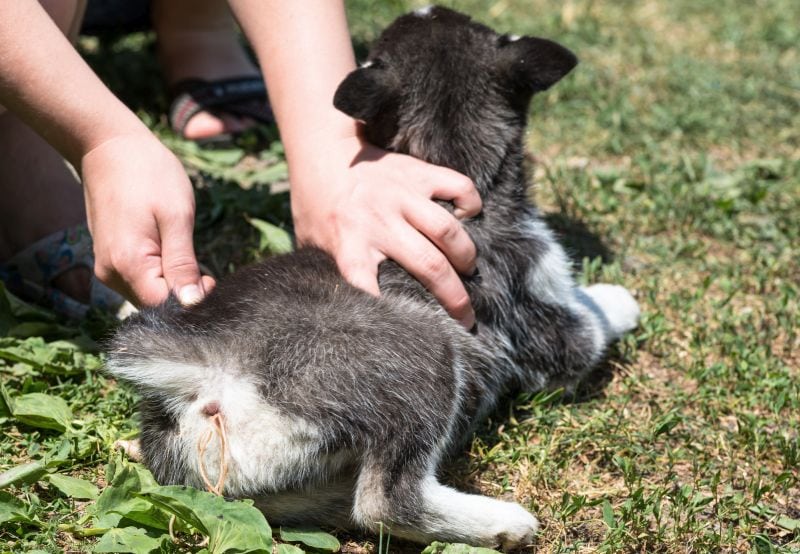
The symptoms worms cause aren’t always obvious, but here are some key signs and symptoms that may indicate your dog has worms:
- “Butt scooting” or excessive rear scratching
- Diarrhea
- Lethargy
- Vomiting
- Change in appetite and/or weight loss
- Coughing
- Poor coat health
- Itchy skin
- Blood in stool
- Pale gums
- “Bloated” appearance
Additionally, the most obvious sign of a worm infestation is seeing worms in your dog’s poop or vomit. Or (as in the photo above), you may even see worms emerging from your dog’s butt.
While these things can be alarming (to say the least), they are pretty common, and no cause for panic. Just be sure to give your vet a call if you notice your pupper exhibiting any of these symptoms.
What Are the Different Kinds of Worms Dogs Get?
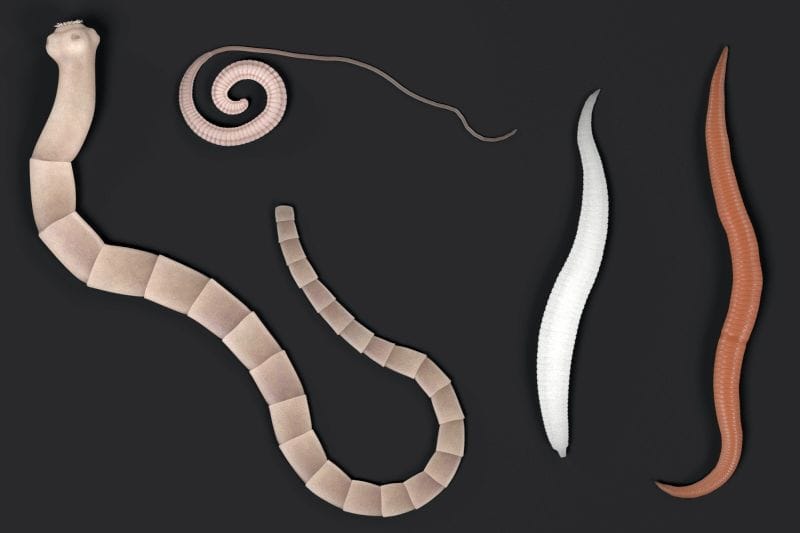
Different types of worms cause different problems and require different treatments. So, here is a basic overview of the different worm types that affect four-footers, so that you can help your pooch stay parasite free.
- Tapeworms — Tapeworms have an indirect life cycle meaning that they need to pass through a different animal species to infect your dog. Dogs typically contract tapeworms from fleas, but they can also get them from eating raw, undercooked meat. These notoriously long worms can reach up to several feet in length and have a distinct, segmented appearance. You may notice tapeworm segments that look like grains of rice in your dog’s poop. Luckily, these worms are easily treated and usually don’t cause excessive harm to otherwise healthy dogs.
- Hookworms — Hookworms are one of the more serious parasites as they can cause coughing, anemia, and diarrhea — they can even be deadly. Additionally, they can build up and reach large numbers if left untreated. These parasites can also be passed to humans, making them particularly problematic. The light-colored worms are tricky to spot in Spot’s stool, so you’ll usually need your vet’s help to verify their presence. Just be sure to take prompt action if you suspect your dog has contracted these parasites.
- Roundworms — Roundworms are relatively large parasites that can be easy to spot in your dog’s feces. If you’ll forgive the imagery, they often look like thin, wiggly pasta noodles. These slender, curved parasites are highly contagious and will often affect all dogs in your household. Roundworms can cause great discomfort by filling your pup’s digestive tract but they’re usually easy to treat with the help of medication. However, these worms can occasionally migrate to other tissues in your dog’s body, which can cause serious health problems and require surgical intervention.
- Whipworms — Whipworms are not to be trifled with as these parasites can cause a great deal of tissue damage along with symptoms like lethargy, weight loss, and bloody diarrhea. Whipworms are usually contracted via the fecal-oral route (such as may happen when your dog eats poop), and they can be difficult to eradicate fully. These resilient parasites look like long threads that are thin on one side and wide on the other.
- Lungworms — There are several different lungworm species that infest a variety of areas in your dog’s respiratory tract. The symptoms vary greatly depending on the location and severity of the infestation, though you may see signs of fatigue, coughing, or wheezing. Lungworms are usually treated with a prescription dewormer, and your doggo will require a specific treatment plan from your veterinarian.
- Heartworms — Heartworms are spread via mosquitoes and circulate around your dog’s bloodstream. Eventually, these worms reach the heart where they can cause serious damage to your dog’s heart muscle. This infestation can cause fatigue and even be fatal if left untreated. Dogs with heartworm must be seen by a veterinarian to start treatment as soon as possible as it can only be treated with prescription heartworm medication. In more serious cases, surgical intervention may also be needed to help remove the dead worms.
Ringworm is actually a poorly named organism, as it’s not a worm at all. Instead, it’s a fungus that can cause skin ailments in your pooch.
You can learn more about it in our article about treating ringworm in dogs.
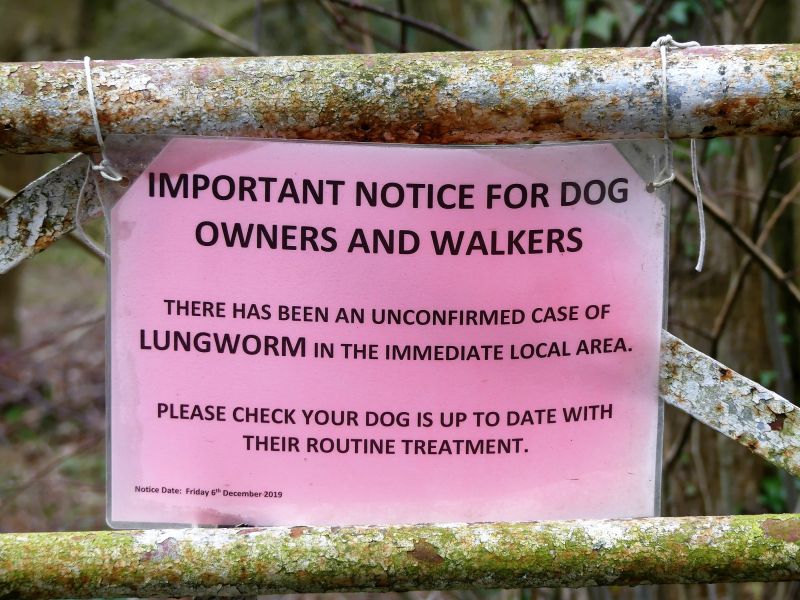
What Do You Do If Your Dog Has Worms?
Different types of worms require different treatments. Accordingly, the best solution is to set up an appointment with your veterinarian as soon as you suspect that your dog has worms.
Your veterinarian will be able to identify the type of worms wiggling around inside your dog and initiate a treatment as soon as possible. This will help minimize the risk of your dog developing secondary infections or more serious symptoms associated with some worms.
Just be sure to call your vet first and ask if he or she wants you to bring in a stool sample for examination. Also, be sure to ask about the correct way to collect and store the sample to ensure your vet can investigate it properly.
If, for some reason, you can’t get your veterinarian’s assistance, you’ll need to obtain a worm test kit to determine which types of worms are present. You’ll also find that some types of worms are easy to recognize visually.
For example, roundworms have a thin, noodle-like appearance, and they’re often easy to spot in your dog’s feces.
Similarly, tapeworm segments (called proglottids) may appear as “grains of rice” in your dog’s poop. These proglottids are actually portions of the tapeworm’s body, which contain the tapeworm’s eggs.
Once you’ve identified the type of worms infecting your doggo, you’ll need to purchase the right dog dewormer to help your pooch become parasite free. While there are some over the counter deworming medications, some will require a prescription from your veterinarian.
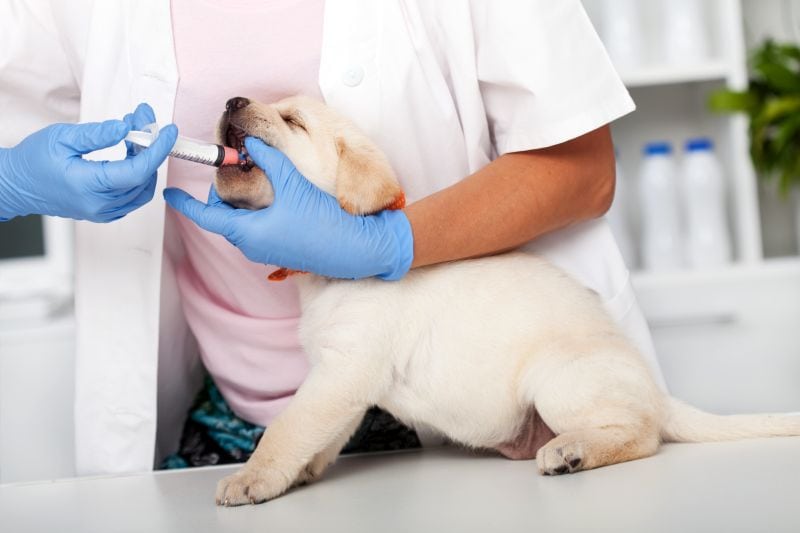
Note that some worm types are fairly persistent, so it may take a couple of treatment cycles until your pup is truly worm-free.
Also, don’t underestimate the importance of prevention. Keep your dog away from street snacks or eating anything sketchy off the ground. You’ll also want to keep Fido far away from feces, especially if he’s a puppy. Be sure to stay up to date on your pup’s preventative flea treatment and visits to the vet to cut down on his risk of contraction.
While worms aren’t always avoidable and are essentially a rite of passage for many dogs, incorporating these preventative measures will help keep your four-footer as safe as possible.
One Last Thing: Don’t Get Worms Yourself

Some worms have zoonotic potential, meaning that they can be passed from animals to humans. A few of the most notable worms that present this kind of threat include roundworms, hookworms, and tapeworms.
So, you’ll want to be extra careful around your pooch if he’s dealing with a worm infestation. Here are a couple of pointers to help reduce your risk of contracting worms yourself.
- Pick up your pup’s poop. Make sure you pick up your dog’s poop as soon as he’s finished his business. This lowers the chances of worm eggs getting into your yard and will keep your community (and the other canines in the neighborhood) clean.
- Practice good hygiene. Wash your hands thoroughly and often, especially after playing with your pooch. Keep in mind that younger dogs are more likely to contract worms so be especially vigilant around puppies.
- Regularly clean your dog’s digs. Make a habit of cleaning your dog’s bed, toys, and any other fabric that may potentially harbor worm eggs. Be sure to recheck your dog weeks after the initial treatment to ensure that your pooch is truly parasite free.
***
Worms can certainly be an alarming site and should be addressed as soon as possible to keep your dog’s tail wagging. Fortunately, with the help of your veterinarian, most worms are fairly easy to treat.
Has your dog ever dealt with worms? How do you protect your pooch from these pesky parasites? We’d love to hear all about it in the comments below!







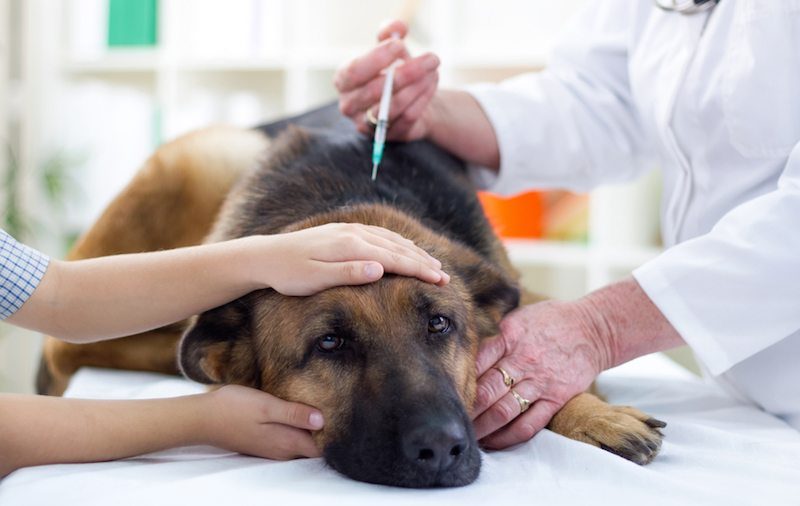






Leave a Comment